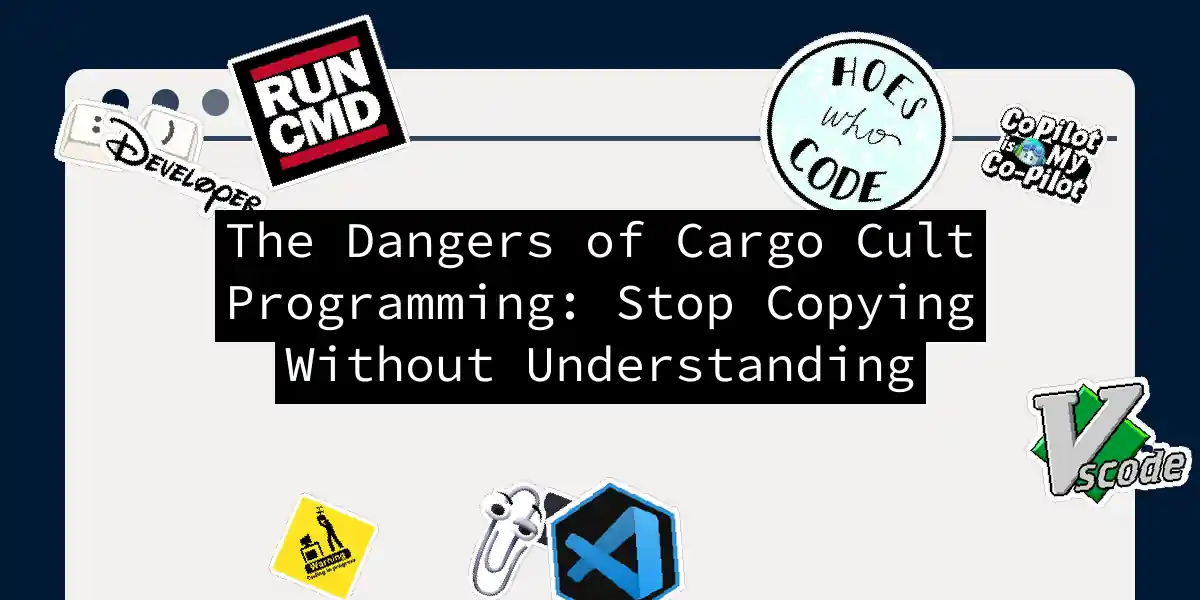Picture this: You’re racing against a deadline, frantically Googling an error message, and you stumble upon a Stack Overflow snippet that promises salvation. You paste it, cross your fingers, and poof – it works! But here’s the rub: you’ve just joined the ranks of cargo cult programmers. Don’t worry, we’ve all been there – but it’s time to break free from ritualistic coding that’s about as useful as a chocolate teapot.
What Is Cargo Cult Programming?
Cargo cult programming is the software equivalent of building bamboo control towers to summon airplanes after WWII. It’s blindly copying code or patterns without understanding why they work. Think of it as wearing headphones carved from wood while pretending to direct aircraft – the form is perfect, but the substance is nonexistent. Real-world symptoms include:
- Adding
Thread.Sleep(1000)everywhere because “it fixed that one race condition that one time” - Writing 200 lines of boilerplate because a conference talk said “microservices need resilience”
- Copy-pasting cryptographic functions from GitHub without knowing what
ECDSAstands for
// Classic cargo cult example: Over-engineered "just in case" disposal
public void ProcessData()
{
using (var memoryStream = new MemoryStream())
using (var cryptoStream = new CryptoStream(memoryStream, ...))
using (var writer = new StreamWriter(cryptoStream))
{
// Actual work happens here
}
// Bonus ritual: Manually calling Dispose() again because "memory leaks"
memoryStream.Dispose(); // "But I saw it in production code once!"
}
This code attempts to manually dispose an object already handled by using – a ritual that adds complexity without benefit.
Why Cargo Culting Is Technical Debt in Disguise
1. The “Works on My Machine” Apocalypse
Copied code becomes landmines when:
// Copied from Stack Overflow #372984
function parseDate(dateString) {
return new Date(dateString.replace(/^(\d{4})-(\d{2})-(\d{2})$/, "$2/$3/$1"));
}
This regex date parser works until someone feeds it 2025-07-05T12:00:00Z. Now your payment module fails silently at midnight.
2. Architecture Astronaut Syndrome
I once saw a team rewrite a perfectly functional CRUD app into event-sourced CQRS because “Martin Fowler said so.” The result? Six months later, they shipped the original version with extra steps.
3. The Copy-Paste Bug Superhighway
Cargo-culted security code is particularly dangerous:
# "Encryption" cargo culted from a blog post
def encrypt(data):
return base64.b64encode(data.encode()).decode()
This “encryption” just Base64-encodes data – about as secure as writing passwords on a Post-It note.
Breaking the Cycle: From Ritual to Understanding
Step 1: The “5 Whys” Technique for Pasted Code
Before using any snippet:
- Why does this solution work? (“It uses a mutex”)
- Why is a mutex needed here? (“Shared resource access”)
- Why is this resource shared? (“Static cache field”)
- Why is the cache static? (“Performance?”)
- Why not use
Lazy<T>instead? (…silence…)
Step 2: Code Autopsies
Next time you paste code:
Diagram: The anti-cargo cult workflow – never implement before understanding
Step 3: The Rubber Duck Debugging Upgrade
Explain the copied code to:
- Your dog (they’ll judge you silently)
- A junior developer (they’ll ask uncomfortable questions)
- A rubber duck (it’ll stare blankly – but you’ll hear the gaps)
Building Cargo Cult Resistance
The “Uncomfortable Truth” Stack Overflow Protocol
When copying:
- Open three alternative solutions
- Read the comments highlighting flaws
- Check the downvoted answers for wisdom
- Write a unit test proving why the code works
Design Pattern Vaccination
Before implementing patterns:
// Ask these questions before pattern adoption:
bool IsPatternJustified =
problem.RequiresAbstractionLayer &&
!team.HasRecurringMaintenanceNightmares &&
pattern.NotIntroducedDuringHypeCycle;
The Path to Enlightenment
I once cargo-culted an entire Redux store into a to-do app. My manager asked, “Why do we need 500 lines to add milk to the shopping list?” That’s when I realized: Understanding beats imitation every time. Break the cycle with:
- Code reviews that ask “why” – “Why did we choose this approach?”
- Spike solutions – Build throwaway prototypes to understand new patterns
- The 24-hour rule – Sleep before adopting shiny new frameworks
Remember: Copy-paste might solve today’s bug, but understanding builds tomorrow’s expertise. Now if you’ll excuse me, I need to delete half the
@SuppressWarningsannotations from our codebase…
